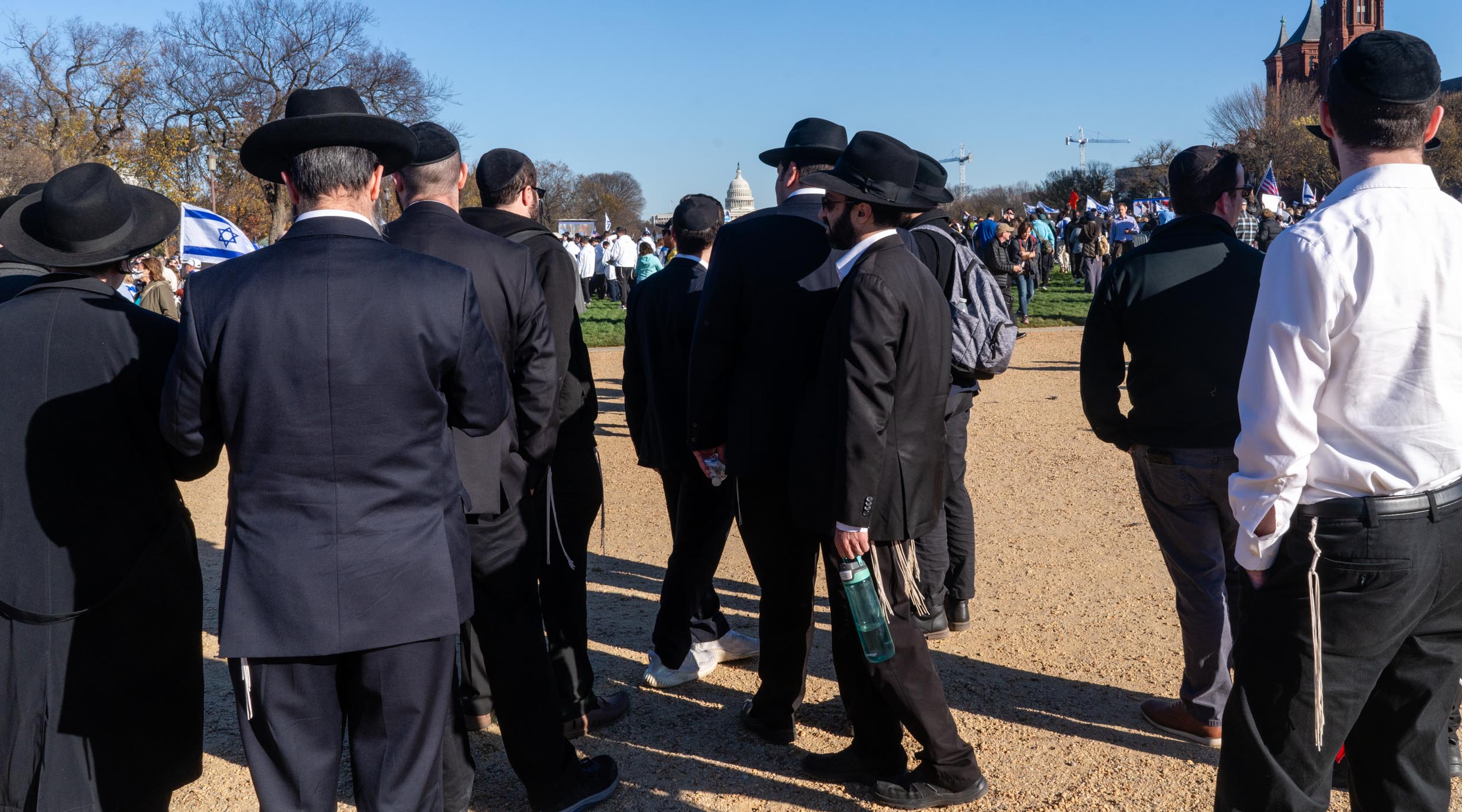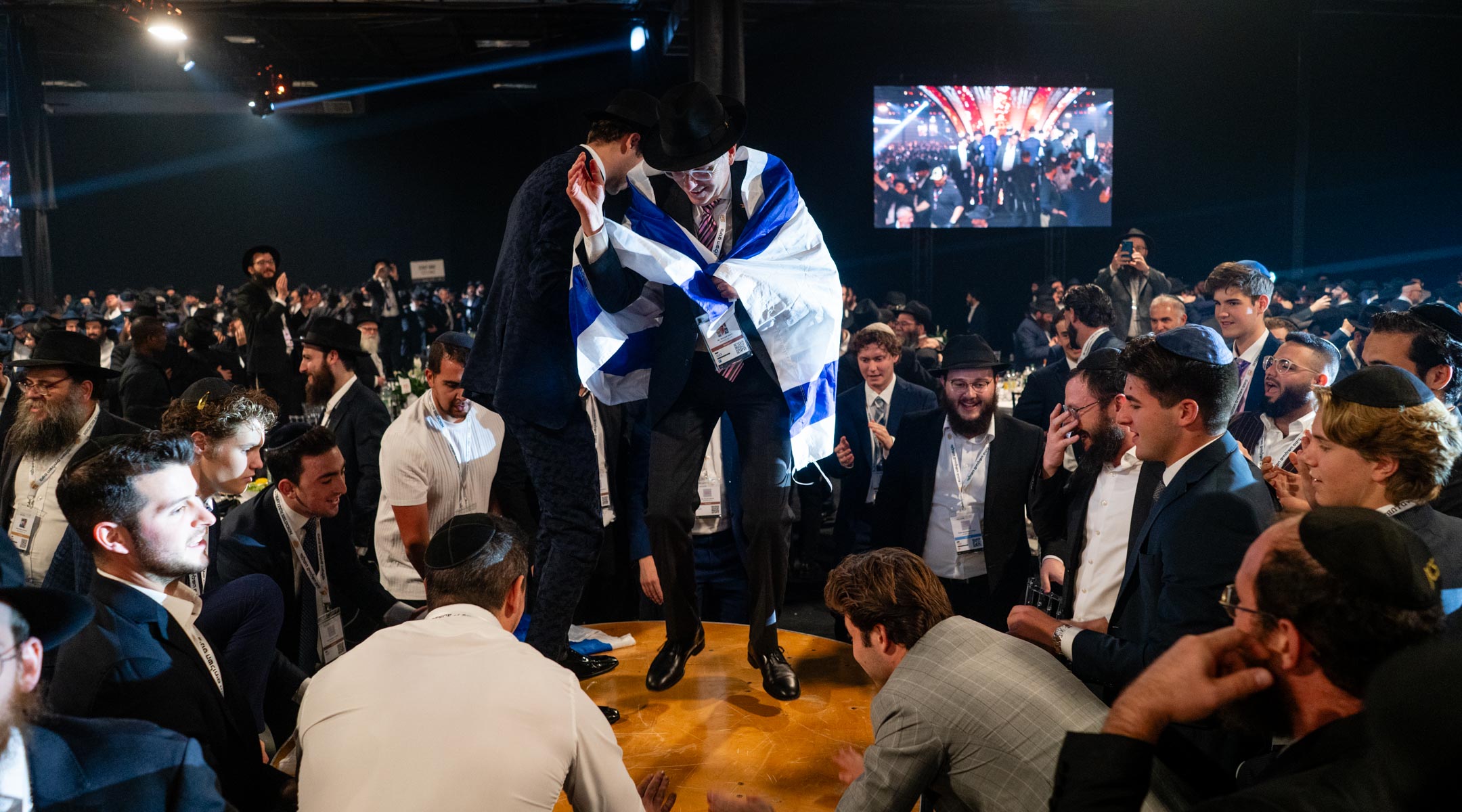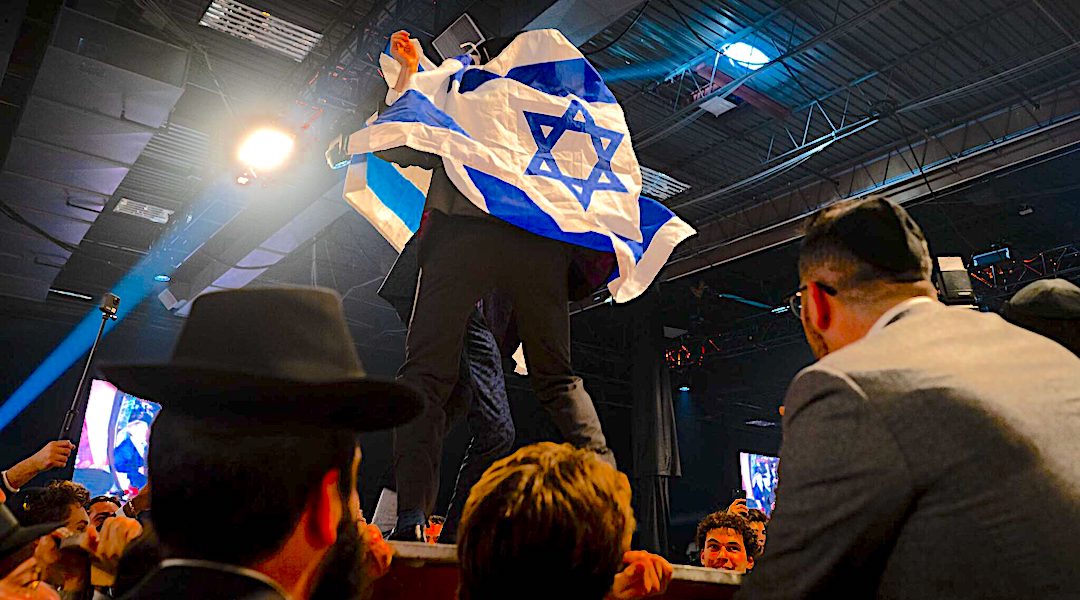(New York Jewish Week) — When 3,000 Orthodox men packed into a New Jersey event hall late last month to mark a milestone in their 7 1/2-year cycle of Talmud study, they added an unusual component to the celebration.
In addition to sermons from prominent rabbis and collective prayer and study, the men watched videos showing uniformed Israel Defense Forces soldiers studying, singing and dancing with haredi Orthodox men and visiting the Western Wall in Jerusalem.
“It was a remarkable evening and an expression of solidarity with the soldiers of the IDF, and with the people in Israel who are feeling besieged and of course those who have been taken hostage,” Rabbi Chaim Dovid Zwiebel, the executive vice president of Agudath Israel of America, the haredi umbrella group that organized the event, told the New York Jewish Week.
What was remarkable about the event was the public celebration of Israel’s soldiers. Haredi movements have a wide range of approaches to Israel and Zionism: Some believe a Jewish state should be established only with the coming of the Messiah, while others are ambivalent and still others vocally supportive of Israel.
But regardless of their attitude toward the state, haredi leaders in New York City emphasize that their communities — no matter their politics or religious observance — have a deep affinity for the land of Israel and its Jewish residents. After Hamas’ Oct. 7 attack on Israel, they say that feeling has sparked an outpouring of support for Israel and its military at a level not seen in decades. Plus, in at least one instance, a prominent haredi leader actively disavowed an anti-Zionist protest group.
“The outrage and sheer brutality of the October 7th attacks has united the Jewish community in common cause in a way I personally have never seen before,” said Chaskel Bennett, a community leader and the co-founder of the Flatbush Jewish Community Coalition who was a pro-Israel activist prior to Oct. 7. “The Orthodox Jewish community always pulled together in times of crisis, but October 7th has touched a raw emotional nerve that has transformed how Jews identify and connect with their brethren in Israel in an unprecedented way.”
Haredi groups in New York do not typically hold organized street rallies, as some Jewish groups have done in recent weeks, but haredi communities have mobilized in their own ways, including by focusing on the traditional practices of prayer and charity.
“In virtually every synagogue people stay a few minutes later beyond the usual closing time of the prayer service and they recite psalms that are appropriate for the situation,” Zwiebel said.

Religious Jews at the March for Israel on the National Mall in Washington, D.C. on November 14, 2023. (Luke Tress)
In the days after Oct. 7, thousands of haredi Jews poured into the streets in Brooklyn’s Borough Park and Crown Heights in spontaneous gatherings to pray and show support for Israelis. In the weeks since, haredi communities in New York have collected supplies for the Israeli military, held vigils for hostages held by Hamas, flown the Israeli flag at events, demonstrated support for secular Jewish college students and organized prayers for the terror group’s victims. Several Hharedi groups, including Agudath Israel, attended a mass demonstration in support of Israel last week, alongside crowds of non-Orthodox Jews.
Haredi websites are raising funds, messages of mourning for fallen troops are spreading across haredi WhatsApp groups and haredi news outlets closely track the fighting in Gaza. In one widely shared clip, a large Israeli flag was hoisted above the crowd at a Hasidic wedding.
“The realization of brotherhood and sisterhood is really displayed in a way that I’ve never seen in my lifetime,” said Avi Greenstein, CEO of the Boro Park Jewish Community Council, a social services organization in the heavily haredi Brooklyn neighborhood, calling the moment an “awakening of unity.”
Even haredi opponents of Zionism have taken steps to disavow anti-Israel activism. A leader of the anti-Zionist Satmar Hasidic movement, Rabbi Zalman Leib Teitelbaum, decried the fringe Naturei Karta group for joining anti-Israel demonstrations, accusing the faction of supporting “haters of Israel and murderers.” Satmar rabbis have also pushed back against growing affinity for Israel and the IDF, however.
Religious events have shifted to focus on Israel, including Chabad-Lubavitch’s annual conference of thousands of male emissaries. A rabbi affiliated with Chabad, which often responds to crises by encouraging Jews to perform traditional rituals, is sending ritual fringes traditionally worn by Orthodox Jewish men to the front lines. The Chabad movement, which is more outwardly supportive of Israel, has been distributing charity to Israelis in need, and some members of its New York community are IDF veterans who rushed back to their units after the war broke out. At least one soldier from the movement was killed in the Oct. 7 attack.
In another event late last month, neighborhood organizers in Crown Heights, Chabad’s Brooklyn home base, set up an empty Shabbat table with 230 seats to symbolize the hostages held by Hamas in Gaza. The event was organized to counter a rally led by hardline pro-Palestinian groups the following day, and drew around 1,200 participants.

The Chabad conference annual gala, in Edison, New Jersey, November 12, 2023. (Luke Tress)
“We prayed, we sang, we cried and we stood in solidarity with both the hostages, the Israeli public and the IDF,” said Rabbi Yaacov Behrman, the president of the Jewish Future Alliance, a community advocacy group. Chabad has also held prayers with families of hostages at the grave of its former leader, the late Rabbi Menachem Mendel Schneerson, and at the movement’s headquarters in Brooklyn at 770 Eastern Parkway.
The IDF is a largely secular institution, and Israel’s haredi men are mostly exempt from the country’s mandatory draft, a policy that has long caused friction in the country’s society and politics. But the outpouring of support for the military in the U.S. mirrors developments inside Israel, where thousands of haredim have enlisted in recent weeks and volunteers have provided meals and prayed with troops. A video showed dozens of haredim dancing in a city square after a female Israeli soldier was rescued from Hamas captivity.
A journalist for a haredi news outlet, Yanki Farber, shared the video on X, writing, “My son asked me right now why I’m crying.”
“Hasidim are dancing in the streets of Ashkelon after the release of a female soldier. I didn’t see anything like this when Gilad Shalit was released,” he wrote, referring to the Israeli soldier freed in a deal with Hamas in 2011. “There is an incredible sense of understanding among all of us that we must not return to being divided.”
The cross-community solidarity in Israel feeds back into the United States, Zwiebel said.
“Attitudes that are developed in Israel proper will have an impact on the broader international Jewish community,” he said. “We’re all in this together and that’s certainly being felt in Israel and, yes, I think there is some spillover and some sense of greater solidarity here in America.”
The surge in antisemitism in the U.S. has also spurred greater haredi solidarity with non-haredi Jewish communities. In an unusual message late last month, Agudath Israel issued a call to support Jewish college students as antisemitism and anti-Israel activism roiled U.S. campuses. The Chabad movement has a presence on hundreds of U.S. campuses and has also played a central role in supporting students.
“There are Orthodox Jews in the colleges, but if you’re not Orthodox, there are Jews in colleges and we care deeply about them,” Zwiebel said.
Despite the outpouring of support, the conversation about Zionism among haredim has not undergone a sea change, Zwiebel said. But he said antisemitism is leading some families to consider Israel as a future home.
“The hostility that we’re facing here in the United States, or even more so in Europe, is that reminding us that these are not necessarily ideal long-term homes for the Jewish people?” he said. “That kind of conversation is taking place. It’s taking place in homes where parents have sent their children to study in Israel and are wondering, ‘Should we bring them back? Should we let them stay there?’”
Several haredi community members said they hoped that the feeling of solidarity would last after the war ends.
“It took a vicious attack by merciless enemies to somehow bring people together,” Zwiebel said. “If we’re looking for a silver lining in this terrible cloud, I guess that would be it. If only we can keep this going beyond this war.”
The New York Jewish Week brings you the stories behind the headlines, keeping you connected to Jewish life in New York. Help sustain the reporting you trust by donating today.





